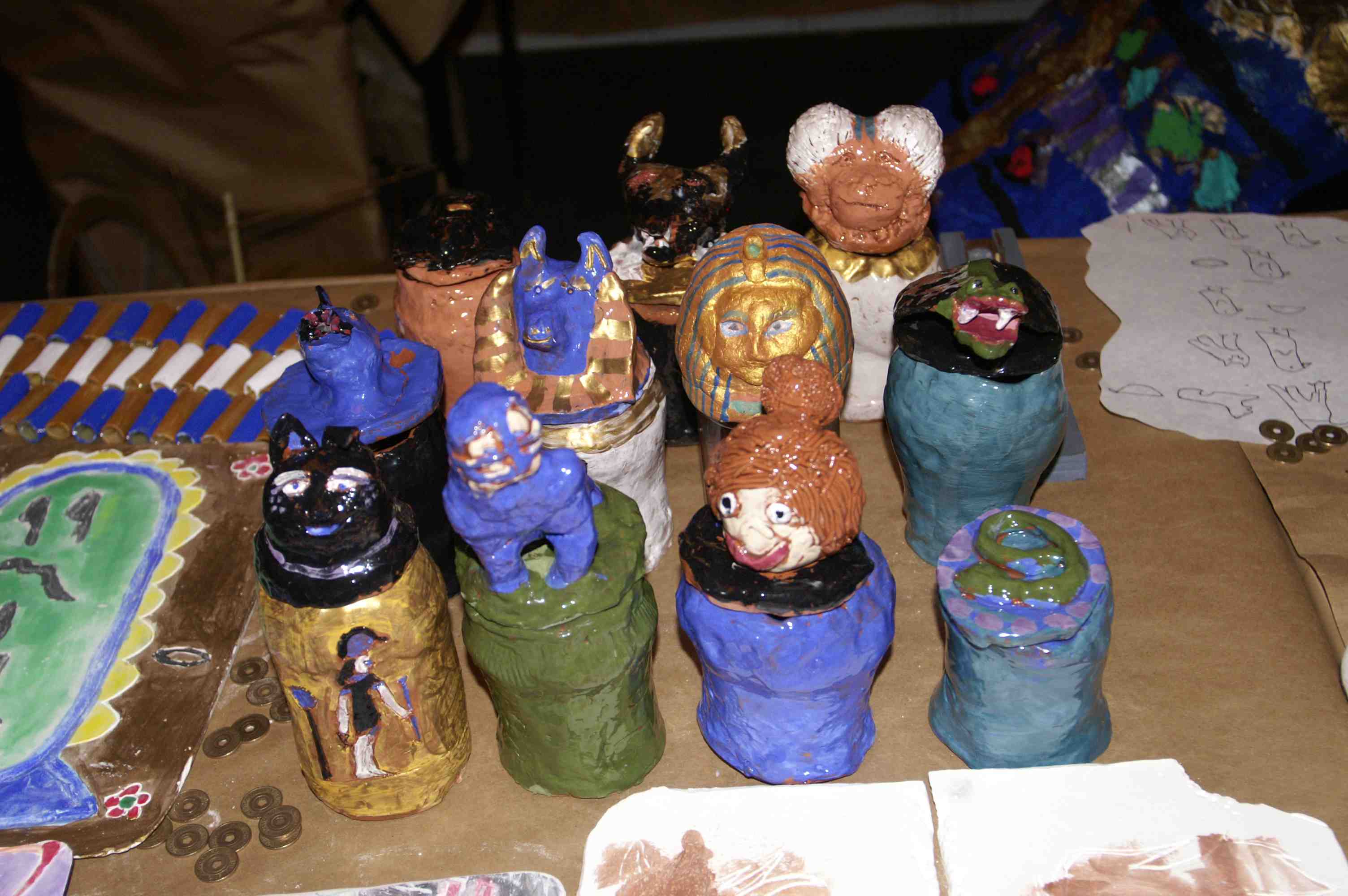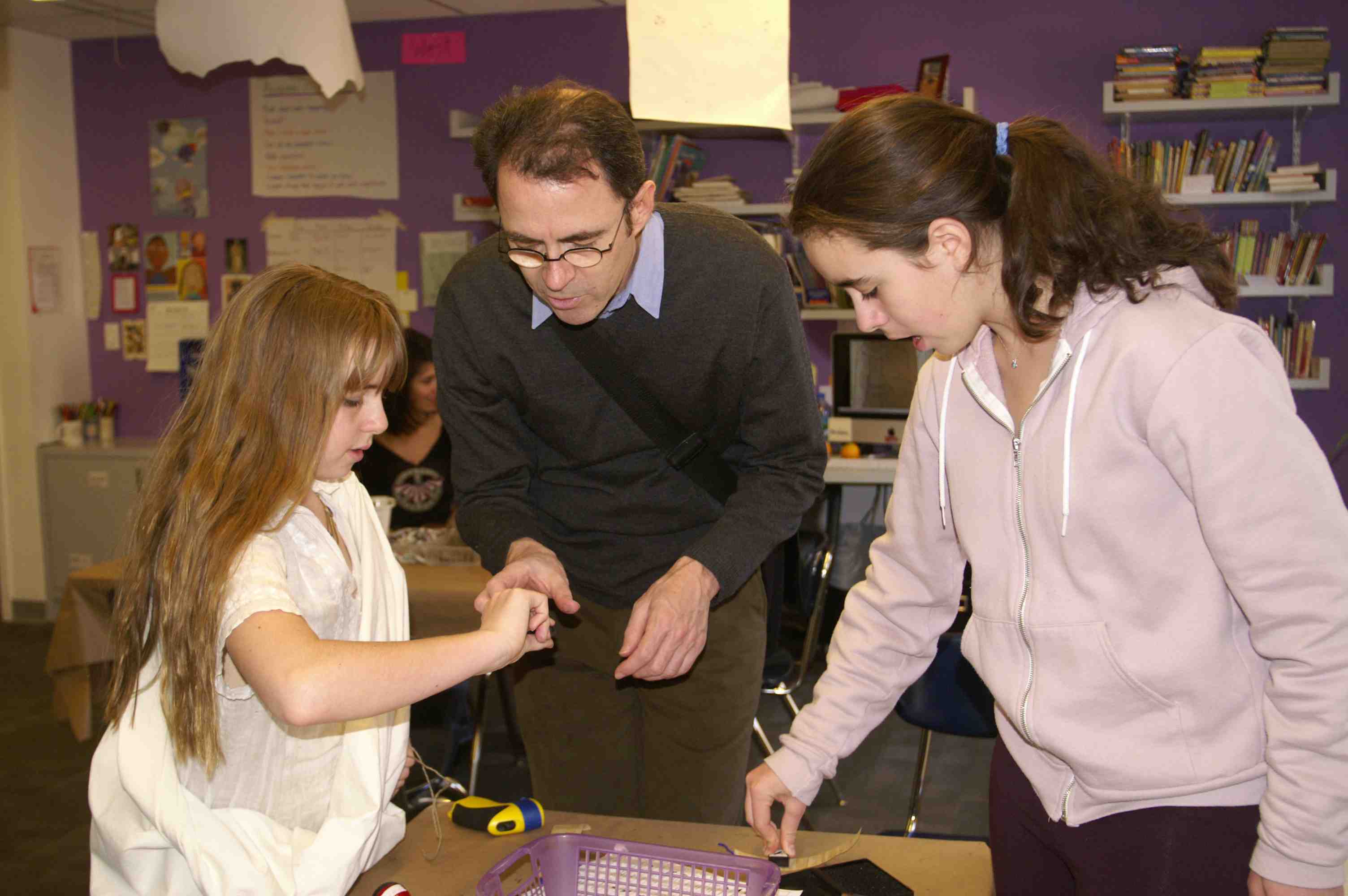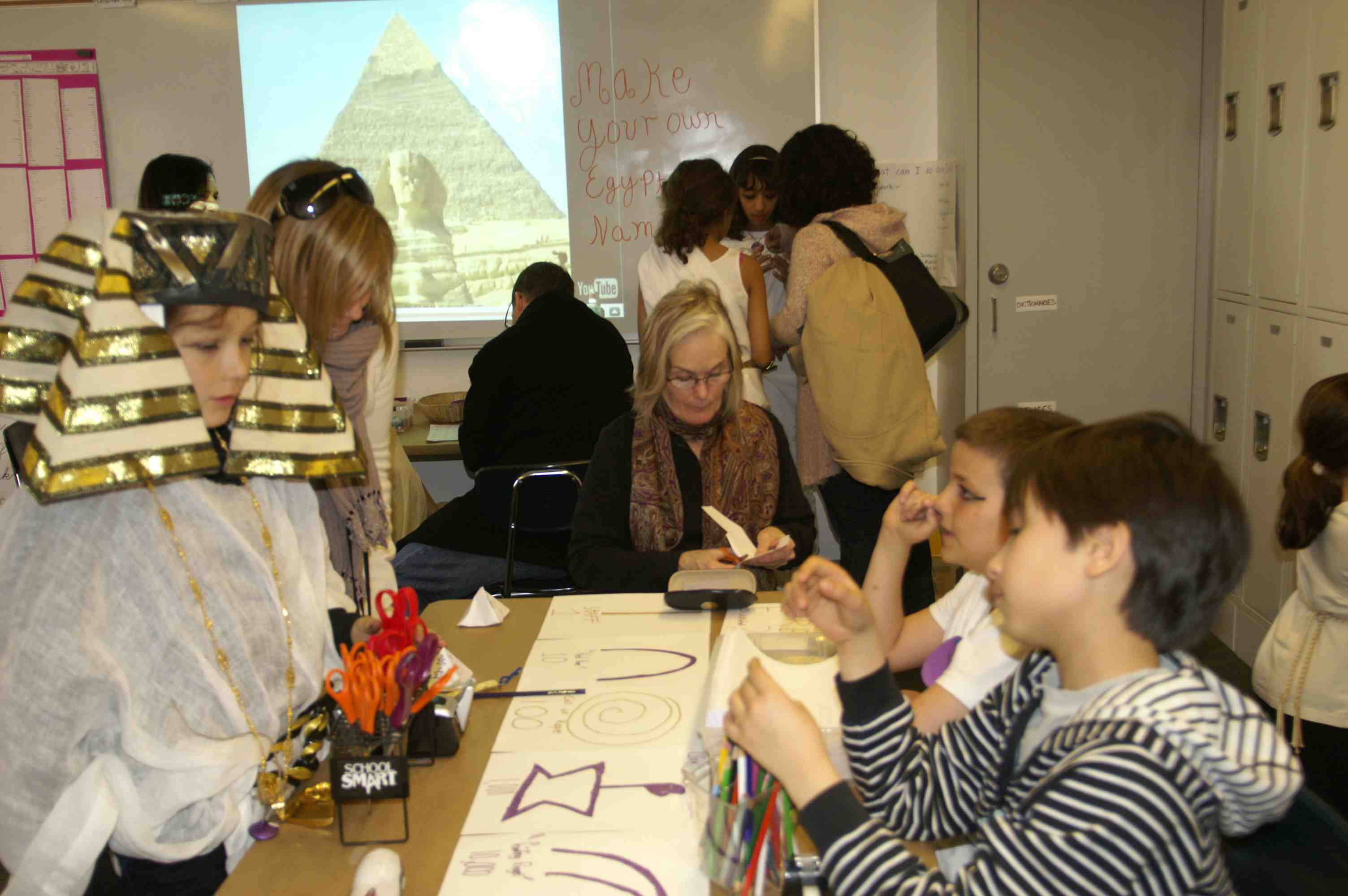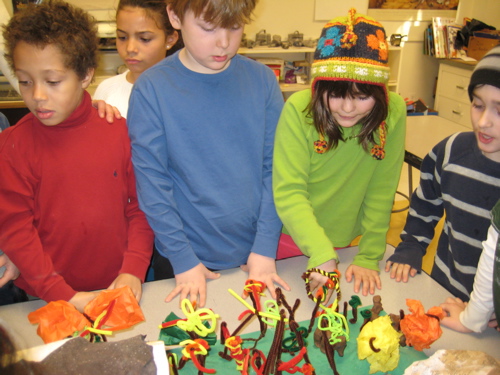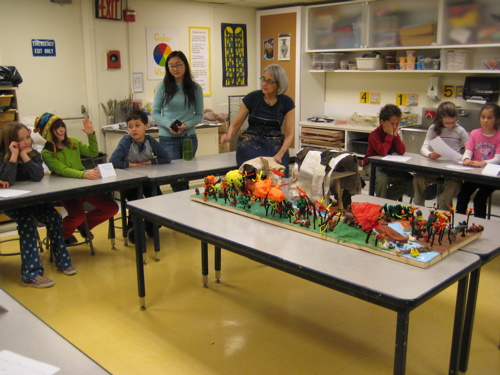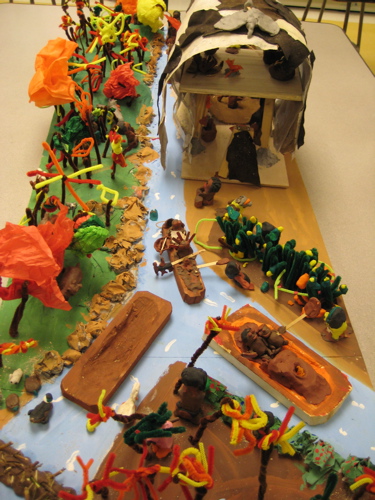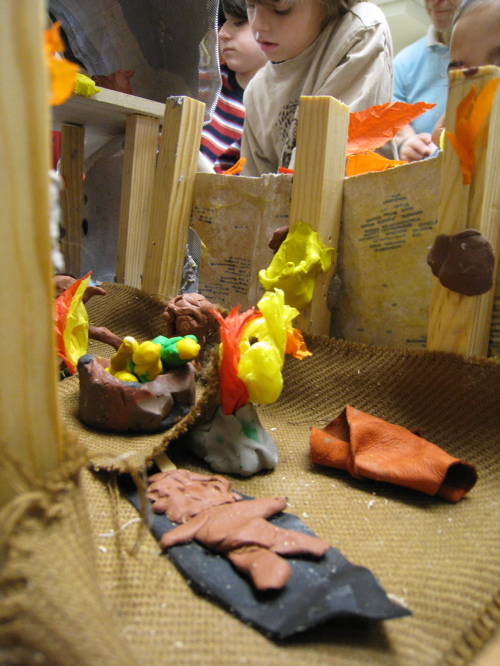On other fronts, students have been serious and focused during this week’s ERB administration. Truth be told, I think they like the three-day break from our regular demanding collaborative, inquiry-based and hands-on work, which was on hold while they sat quietly in rows, contemplated each question and carefully filled in the bubbles on their answer sheet. That said, we did reward ourselves on Wednesday afternoon with our annual Literary Festival during which students participated in a range of exciting workshops. This year’s menus of offerings included the following:
Booktalking (with Jennifer Hubert Swan). Want to find a more dynamic way to tell someone, “You’ve got to read this book!”? Jen, the Queen of the Book Talk, will teach you how to help uncover the joys of reading for others.
ACTION! . . . Making a Story Into a Script (with Maureen Johnson) Ever go see a movie made from a book? Ever wonder why it’s so different? The same but . . . not the same? Why does stuff get left out? Why do characters change? WHAT IS WRONG WITH THESE PEOPLE? Don’t they KNOW they left out the most important part? Or maybe you just wonder how they do it at all—how do they take hundreds of pages of story and turn it into something you can see and hear. How does that work? The answer to all of these questions is HERE! Now you can learn about the art of adaptation—taking a story in one form and changing it to another—and try your hand at it yourself!
Found Poetry (with Heather Brandstetter). Explore the streets of New York and find the poetry that is there everyday. Heather will lead participants on a poetry-finding adventure!
Writing Music (with Matt McClean) In this workshop we will cover the process that goes into composing music. We will look at how composers go about composing melodies and harmony and the part that rhythm plays in putting it all together. In addition we will examine the process of orchestration in an attempt to answer the question: How do composers decide which instruments to write for.
Who the Heck Are You?! (with Dennis Kitchen). A perennial favorite! Ever wonder who that person is you see wandering around the building? You know they work here, but you’re not quite sure what they do. In this workshop, you’ll be outfitted with a camera and you’ll hunt these people down, snap their picture and then interview them. Dennis Kitchen will share interviewing techniques and help you create a fascinating bio on that person you think you know, but not really…. Note: If you have a digital camera, please bring it to this workshop.
Visual Autobiography and Bookmaking Workshop (with Melissa Rubin and Robin Shepard). Come prepared to create your very own hardcover autobiography. Bring in memorabilia that tells a story about you. Any flat 2-D special items can be included. Items such as: your prose and poetry, photos, maps, stamps, feathers, ticket stubs, playbill covers, movie ads, pressed flowers, etc. can be used (anything that can be glued into a book that has personal meaning). Note: Bring special items for your book to this workshop.
Playwriting (with Raquel Cion). In this workshop, you will join in a facilitated discussion of what constitutes dramatic writing. The building blocks of playwriting (character, action, conflict, setting) will be explored using tools such as automatic writing, image, and structured writing time. You will learn about the who, where, what, and how of constructing scenes. Through this exploration each student will write their own “mini-play”. These plays will then be read aloud and the workshop will culminate in a discussion of how to continue writing and creating plays on your own.
Scrap Booking (with Margaret Andrews). Margaret will provide the materials; all you need to do is bring in photos you’d like to include in your scrapbook page. Learn how to document your photos and create a keepsake that records special moments, people and places in your life. Note: Bring photos for your scrapbook page to this workshop.
Striking Viking Story Pirates — In this interactive workshop, you’ll work with members of the Striking Viking Story Pirates theater group. They’ll guide you through a dynamic process in which individuals and small groups will write and act out stories. After the workshop, the Story Pirates will take these ideas back to their secret headquarters/laboratory, and several weeks later, they will return for Middle School meeting with newly-built puppets, props, and a brand new sketch comedy show, including some new stories written by participants in the workshops.
Newspaper Writing (with David Lee). Ever want to write for a newspaper? Well David has, and he’s going to show you how you can too. In this workshop, you’ll learn how to come up with a story idea, a headline, how to interview people and how to write your piece. You’ll come up with the subject and David will help guide you through it. And he should know – his recent article about surfing in NY appeared in the New York Times this January!
Picture Books and Children’s Literature (with Matthew Rosen and Michelle Boehm). In this workshop, Matthew Rosen, a former editor, will talk about writing and constructing picture books. You’ll have the opportunity to create their own picture-book. You will lay out text, add illustrations, and format you book.
Enter The Writing Ninja (with Libba Bray) The mighty writing ninja approaches the story. It will not get away this time, for the ninja is strong and creative and also, the story is due tomorrow at 8:20, and not to turn it in is unacceptable to the ninja’s code of honor and the teacher’s grade book. Suddenly, from out of the shadows come the ninja’s greatest enemies: Writer’s Block, Lack of Inspiration, Boring Characters, Even More Boring Plot, and–worst of all–the dreaded Inner Critic. It will take all the stealth warrior’s cunning and writing ninjutsu to lay waste to these enemies. But how to defeat these monsters? How? HOW? HOOOOOWWWWW? (That was for dramatic effect. Four how’s would have been overkill. This is what we’re talking about here.) Come learn tricks to get your mind into prime fighting mode, featuring the Nunchuks of Word Styling, the Legendary Pressure Point Move of Improv Story-Building, and the Final Whammy of Something-I-Have-Yet-to-Make Up. For this workshop, you will need only paper, a writing implement of some sort, a sense of humor, and a thirst for adventure which cannot be slaked through ordinary means, such as Snapple Fruit Punch. Your heart is strong, mighty warrior. Soon, your writing will make nations tremble.
Tasting And Writing About Food (with Mario Batali). In this workshop, you’ll taste foods that are examples of the 5 taste sensations: sweet, salty, sour, bitter and umami (and if you don’t know what this taste sensation is, you will by the end of the workshop!) Afterwards, you’ll describe these tastes without using their 5 exact terms (such as salty or sweet). You’ll discuss the geography of the tongue with chef and cookbook author Mario Batali, and he’ll show you how you can translate sensation into words.
 Medieval Pageant Overture: Hide Player | Play in Popup | Download
Medieval Pageant Overture: Hide Player | Play in Popup | Download

